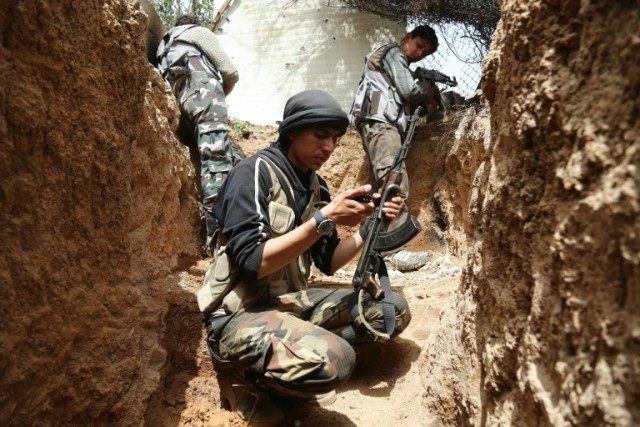Geneva (AFP) – Talks to end Syria’s five-year conflict resumed in Geneva Wednesday, with the UN mediator vowing to tackle the thorny issue of a political transition, as surging violence threatened a fragile truce.
Adding to the tensions, Syrians in government-controlled areas voted Wednesday in parliamentary elections not recognised by the United Nations or by President Bashar al-Assad’s main opponents.
In Geneva, UN Syria envoy Staffan de Mistura said he planned to engage the parties in concrete discussions about how to move the war-ravaged country towards a change of government.
“We are going to go deeper and deeper into the issue of political transition,” de Mistura told reporters after a first meeting with the main opposition High Negotiations Committee (HNC).
The UN-brokered talks in Geneva are aimed at forming a transitional government and a new constitution followed by general elections to end a conflict that has killed more than 270,000 people and displaced half of the country’s population.
Moving beyond the broad principles discussed during previous rounds of indirect talks to concrete proposals towards political change will likely be challenging.
Assad’s fate remains a major stumbling block, with Damascus until now maintaining that even discussing the issue of his departure is off limits.
– Agenda agreed –
It remains to be seen if the regime delegation, which has been delayed due to the parliamentary vote and is only set to meet with de Mistura on Friday, will agree to broach the subject.
But HNC delegation chief Assad al-Zoabi struck an upbeat note on the chances of progress, telling reporters after Wednesday’s meeting that “we hope that during this round we can reach an agreement on political transition.”
In a bid to shore up support for his agenda, de Mistura has in recent days travelled to Damascus, where he met Foreign Minister Walid Muallem, and also met key Assad allies in Moscow and Tehran.
“They all indicated interest and support actually in the progress of a political discussion aiming at a political transition,” he said, adding that “even Damascus agreed on the fact that this was the agenda.”
Russian Foreign Minister Sergei Lavrov told reporters in Moscow the new round of talks was important, and would allow the parties to discuss the new constitution “and how they see the structure that will ensure a peaceful transition towards a new system.”
But the start of the talks were clouded by a surge in violence in recent days has threatened a landmark ceasefire that took effect on February 27.
The partial truce brokered by Moscow and Washington had raised hopes for a resolution to the conflict, by bringing about a significant drop in civilian deaths and allowing increased aid deliveries.
But humanitarian access has recently slowed again to a crawl, and escalating fighting in northern Aleppo province, parts of Hama province and Damascus has sparked alarm.
More than 100 troops, pro-regime militia, jihadists and rebels have been killed in four days of fierce fighting along a strategic front in Syria’s Aleppo province, the Syrian Observatory for Human Rights said.
Jihadists like those from Al-Nusra and the Islamic State group are excluded from the ceasefire. But in some areas, Al-Nusra is allied with rebel forces meant to be covered by the truce.
Observers have warned that an assault on Al-Nusra in Aleppo could draw in more moderate factions, derailing the peace efforts.
Zoabi on Wednesday condemned the “repeated and deliberate (ceasefire) violations by the regime” and warned of “the negative effects that such regression can have on the whole process.”
On Tuesday, US Ambassador to the UN Samantha Power also warned of “signs that this (the ceasefire) is slipping” and urged Assad ally Moscow to put pressure on Damascus to “get the regime back with the programme”.
– Ceasefire ‘still holding’ –
De Mistura also voiced “concern about the deterioration of the security situation,” but stressed that the violations were “still incidents and not a bushfire, and therefore we consider … that in spite of the several and serious incidents, the cessation of hostilities is still holding.”
Wednesday’s parliamentary elections added to the tension surrounding the negotiations.
The vote was held in areas under government control — around a third of Syrian territory where some 60 percent of the population lives — and is expected to see Assad’s Baath party maintain control over parliament.
“This is a farce,” Zoabi said, echoing a sentiment widely heard on the ground.
But others hailed the vote, with 37-year-old Yamin al-Homsi, a voter in Damascus, saying it would “decide the country’s future”.
Russia’s foreign minister also defended the elections, saying their “role is to not leave a (power) vacuum.”

COMMENTS
Please let us know if you're having issues with commenting.